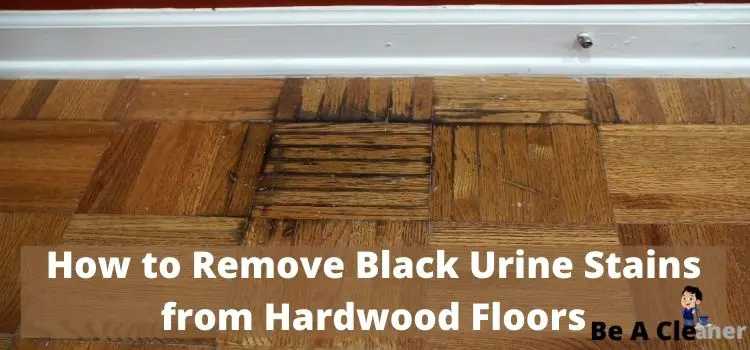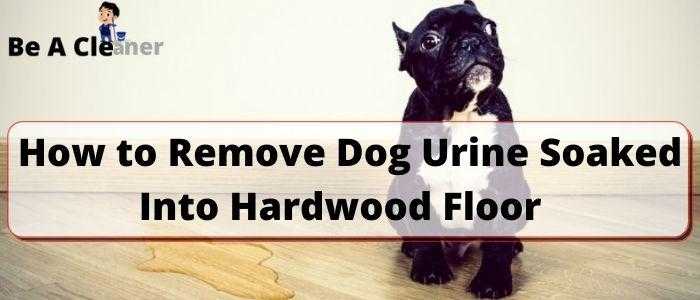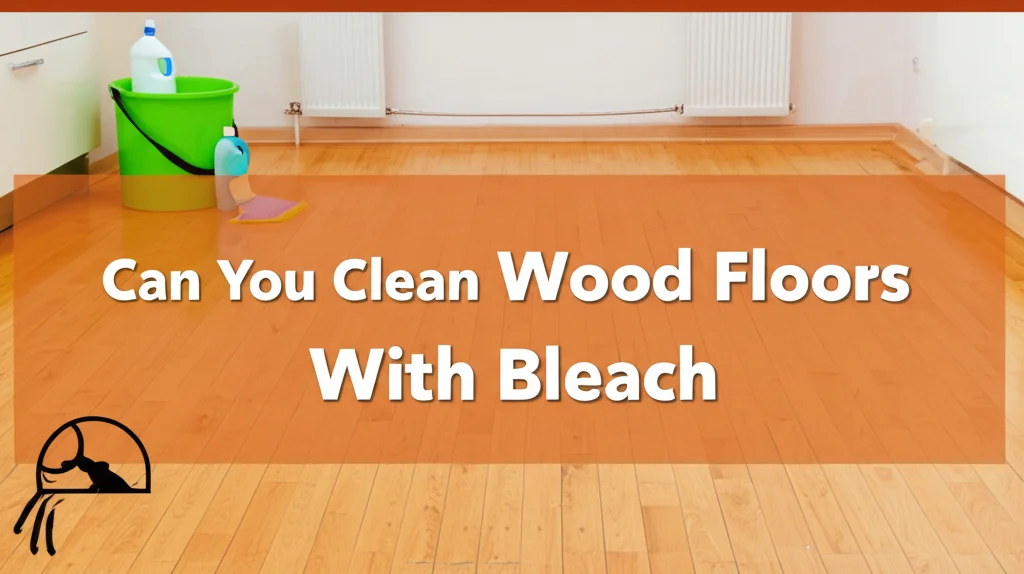· Floor Cleaning · 9 min read
How to Remove Black Urine Stains from Hardwood Floors

Cleaning the fresh pet urine is just a piece of cake. But it becomes a headache when the urine turns into black stains.
As the urine goes deeper into the hardwood plank, it’s a bit challenging to eliminate the black urine spots.
The good news for those who fail to remove the cat urine stains is- nothing is impossible.
And this guide will introduce you to five alternative cleaning methods to treat the black urine stains on hardwood surfaces. So, keep reading to explore the way of disappearing pee stains.
How To Remove Black Urine Stains From Hardwood Floors [5 Alternative Cleaning Methods]
Dark urine stains on hardwood floor look dirty and you need to remove it right off the bat to bring back the natural appearance of the flooring.
And this chapter will disclose the unfailed cleaning methods to treat the pee stain on wood floor.
01. Hydrogen Peroxide
Hydrogen Peroxide is the best urine stain remover for hardwood floors. It doesn’t only get rid of the pee stains but also sanitizes the hardwood floors.
This ingredient contains anti-fungal, anti-bacterial, and anti-viral properties to kill those germs or viruses that creep into the hardwood surfaces.
Cleaning Equipment You Need: A bottle of 3% Hydrogen Peroxide, rubber gloves, microfiber clothes, and a spray bottle.
Applying Procedure:
- Fill the spray bottle with water and the Hydrogen peroxide. Ensure you mix both water and the ingredients properly.
- Apply the cleaning solution directly to the affected area. Leave the solution for several minutes to let it sit. After that, remove the excess water with the microfiber cloth.
- Scrub the stained area with a greater force to remove the pee stains.
Safety Tips:
Hydrogen peroxide is a hard agent. So, it’s worth taking a bit cautious steps while applying it.
We recommend you start with inspecting the floor you want to clean. Just sprinkle a little bit of hydrogen peroxide solution on the floor and see whether it bleached the surface or not.
Also, make sure your skin doesn’t get in touch with it. It will damage the skin. If you use it without mixing with other agents, wear gloves and a mask and directly spray one the pet’s urine.
02. Baking Soda
Baking soda is a household ingredient you can trust to get rid of old urine stains on hardwood floors.
It has the natural muscle to lift the black urine spots up from the wood surface.
Cleaning Equipment You Need:
Make sure you have these cleaning accessories at your fingertips:
- Baking Soda
- Water
Applying Procedure:
Make a cleaning paste by mixing a small amount of baking soda and water. Then, apply the paste to the affected area and leave it for several minutes to sit & dry.
When it gets dried out, the baking soda will turn into powder. Lastly, vacuum off the remaining or dry powder.
Safety Tips:
Baking soda is a bit abrasive and it’s not pH neutral. If you add too much baking soda, it will dull and ruin your hardwood surface. As baking soda is acidic, it has the power to remove dirt or grime.
But the heck is- acid doesn’t mix well with wood. Adding an excessive amount of baking soda will react with tannins and stain the wood (according to this source).
To avoid this chemical reaction, add a little amount of baking soda. Vacuum up it right off the bat when it gets dried.
03. White Vinegar
Vinegar is a natural disinfectant and deodorant. It is an acidic product that adds the cleaning muscle for spot-cleaning the hardwood surface.
However, it’s not a good idea to use the vinegar solution to sanitize the entire hardwood surface.
Cleaning Equipment You Need: Vinegar, a soft cloth, and water, and a bucket.
Applying Procedure:
- Start with pouring a gallon of water into a bucket. Then, mix 1 cup of vinegar into the bucket and dilute it more than you do normally.
- Dip a microfiber cloth into the vinegar & water solution and wring all the excess water out evenly. Ensure the cloth is not dripping wet. It should be damp. It will help you avoid a pool of water on your hardwood surface
- Scrub the affected or urine stain spot. Keep scrubbing until the stains disappear. Never try to clean seams between each plank. Otherwise, water may seep into and cause the boards to warp or damage the finish.
- Once you remove the spot, dry the floor right off the bat.
Safety Tips:
As we mentioned earlier, Vinegar is acidic. Though you will notice no immediate effects, it will eat away the floor finish over time.
And when the hardwood finish gets damaged, the water will penetrate and cause the surface to warp or degrade.
In short, vinegar will damage the hardwood flooring by eating away its finish over time.
However, A.J Rose, a UK-based flooring retailer said, ‘Taking care of hardwood floors will depend on its finish.
Every flooring manufacturer has a specific guideline to let the users know what the safe cleaning method is.
We recommend house owners to use hardwood cleaning kits like Bona.” He also said, “vinegar is not typically harmful unless you flood the floor with water.”
From his saying, we find that whether you should use vinegar or not will depend on the floor finish type. Vinegar will be safe for sealed or prefabricated hardwood surfaces, not unfinished or waxed wood floors.
The second point is you shouldn’t clean the hardwood floor with excessive water as this floor can’t withstand water.
In other words, you can use vinegar solution to safely clean the hardwood surface without flooding it with water. Always, wipe away the black urine stains area with a damp cloth.
The key takeaway is- you can safely clean your hardwood floor with vinegar if you use it rightly.
04. Dish Soap
Dish soap is a natural yet powerful cleaner you can use to remove old urine stains on hardwood floors.
It leaves no residue like other chemical-based cleaners, which make it a great option for cleaning hardwood surfaces.
Cleaning Equipment You Need: Dish soap, a bucket of water, a bucket, and a microfiber cloth.
Applying Procedure:
- Add a few drops of dish liquid/soap in one bucket of water, add half a cup of white vinegar, and mix until bubbles show up. Or add some baking soda and mix until the baking soda dissolves.
- You can use it as a spray or use a cloth. Take a spray bottle, pour some mixture on it and spray on the pet urine stain surface directly.
- Leave it to soak the excess urine.
- When the liquid is dried, use a microfiber cloth and wipe it away. Or take a cloth, dip it into the mixture and damp the satin a few times; if needed, rub the stain with it softly.
- If the stain isn’t yet gone, repeat the process.
Safety Tips:
Unlike other cleaning ingredients, dish soap is comparatively gentle. It doesn’t bring any damage to your hardwood surface.
Just make sure you don’t flood the wood floor while using the solution of dish soap and water.
05. Try an Enzyme-Based Cleaner
You can use an enzymatic cleaner to break up the pet urine. We bet you know how quickly the pet urine saturates the hardwood floor.
But the heck is- you can’t extract it without using a specific cleaner to break the pee stain down.
We recommend you try the Nature’s Miracle Hard Floor Cleaner. Its bio-enzymatic formulate doesn’t only break down the urine stains but also help remove the odor.
Cleaning Equipment You Need: An enzymatic-based cleaner, a microfiber cloth.
Applying Procedure:
- Shake the cleaner well.
- Remove the excess liquid as much as you can.
- Apply the cleaning solution directly to the stained area and leave it for 5 minutes to let the solution sit.
- Use a microfiber cloth to rub the area to remove the pet urines from the hardwood surface. If needed, repeat the process until you get the black stain out of the surface entirely.
Safety Tips:
Before using, make sure you test it by applying the solution to a hidden area. Then, wipe the surface with a cloth.
If it removes the floor finish, don’t use it. Also, we suggest you not apply on visibly worn, unsealed, or unfinished hardwood floors.
Know More on Be A Cleaner
How to Remove Turmeric Stains From Carpet
How to Clean Hardwood Floors with Vinegar
How to Remove Haze from Engineered Hardwood Floors
Frequently Asked Questions
What Causes Black Stains on Hardwood Floors?
Several reasons are to blame that cause black stains on hardwood floors. For example, high level of tannic acid when forms a chemical reaction with the finishing element applied to the wood floor will cause floor discoloration.
Similarly, excessive humidity in the environment can leave black molds on hardwood surfaces. Therefore, urine, vomit, and poop also contribute in the appearance of black stains on the wood floor if you don’t clean them right off the bat.
Why Does Pet Urine Stain the Hardwood Floor?
Pet urine stains the hardwood floor if you don’t clean it immediately because the ammonia in the urine reacts with the tannins in the wood.
This chemical reaction between the two ingredients breaks down the finish of your hardwood floor and form the black stains.
Can Pet Urine Damage Hardwood Floors?
Yes, pet urine damages hardwood floors because the urine contains ammonia acid, which reacts with the tannins in the wood.
If the pee penetrates into the wood flooring, it will severely damage the wood surface by warping or splitting.
The pet urine can also leave mold on the hardwood surface behind staining it.
Does Human Urine Damage Wood Floors?
Yes, human urine damages wood floors. Human urine generally contains uric salt crystals.
If you don’t treat it immediately, it will burn the wood floors gradually. In return, it leaves black stains on the hardwood surface.
Can You Sand Urine Stains out Of Hardwood Floors?
It actually depends on how deep the urine penetrates the hardwood floors. As the pet pee go deep into the wood floor, you can’t remove the stains out of hardwood floors by sanding.
However, you can run a test to see whether sanding can get rid of stains or not. Start sanding the affected area using 36 or 40 grit sandpaper.
If the stains go in vein gradually, you are good to go sanding the floor to make the urine stains disappeared. Otherwise, it makes no sense to sand the floor deeply.
Conclusion
Hydrogen Peroxide is the best cleaning agent you can try first. It brings no damage to your hardwood floor yet is powerful enough to fight against the black urine stains.
However, you can also try out other cleaning methods we mentioned if somehow Hydrogen peroxide disappoints you (though the chance is very low).



